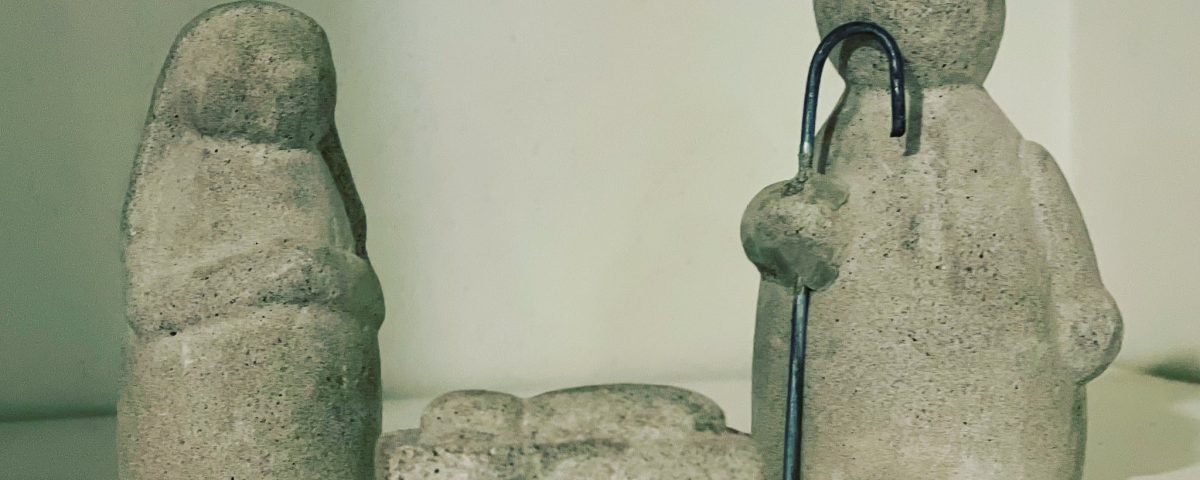St. Bernard of Clairvaux, the great Cistercian, said once that the Christmas homily should be brief—shorter than normal.
It’s not that he cared what people thought about long homilies—like me, he did not; rather, he said that the preached word should be small, because Christmas was a feast celebrating how the Word of God became small. Verbum abbreviatum it’s called, the abbreviated Word; at Christmas, in the incarnation, God “abbreviated himself,” St. Bernard said. Thus, preachers should do likewise at Christmas; they should abbreviate themselves. And everyone else too: they too should learn from this Christmas smallness, the smallness of God, and humble themselves, empty themselves, embrace smallness—each in like manner.
But why did God get small? St. Bernard said that normally, and rightly so, humans are afraid of God. We tremble before the face of the Lord. Why? Because, the way he put it, we creatures “were caught in theft”—in Eden, our first sin, trying to become gods for ourselves; and we’ve been nervous ever since. That’s why when God came looking for us, just after we had sinned, in Genesis it says man and woman hid from God.[1] And that’s why, as I said, ever since, we’ve been ill at ease with God, filled with fear at times, some of us to the point of hating God, denying he exists; hence, the awkwardness of atheists. Because we were caught in theft and the guilt of it has deformed us, deformed our world; and at some level, all of us know it.
Which is why God “came to us as a little child,” St. Bernard said; I am still simply sharing what that great father and mystic of the Church preached way back when.[2] A baby, you see, does not instill fear; a baby draws attention to himself or herself, inviting adoration and smiles and affection and care. If you are morally normal, you will naturally bear some measure of love for a baby. To tremble before the face of God and his wrath is as far away from cooing in love, looking into a baby’s eyes as you can get; and so, why do you think God became a baby? Why do you think God became small? Maybe it’s because he’s trying to get us to notice him, to see him, to love him. Maybe the incarnation is simply God doing what he’s done ever since he first started looking for us in Eden. Maybe Christmas is simply about God wanting us to see him.
I don’t know, some of you will get this. Others will not. Christmas is a funny thing, drawing all sorts of people, saints who see as well as those who judge themselves too sophisticated for it—unbelievers who don’t want to think too much about what may be their unhappiness, what they feel; so, it’s better simply to be polite, look down on it all, and with steeled emotions refuse truth. I don’t mean to pick on you if that’s you; welcome, truly. I love you; I was once you. I don’t know, it’s just something St. Augustine said that changed me when I was where you are: when he said of himself, “I…was daring to seek what only a humble person can find.”[3]
For all of us, though, that’s the truth; the truth is the same. God became small so that we might find him without fear. And so, let’s look for him: first, in the littlest faces that won’t get much sleep tonight; in the poorest faces who look to you for help; in the smallness of silence; in the littleness of prayer prayed up against the immensity of all your problems; in the littleness of the Eucharist, so small but so full of God, so hidden to all but those with faith.
What I mean is merry Christmas everyone. In this weary world, this feast is still so beautiful. My prayer is that you see a little of that beauty, just enough, as much as you need. It is, I believe, evidence that God is still looking for us; and for that, I am grateful. May we become little to find this little God. May we find him here—first around this table and then around yours. These tables, these altars, our hearts waiting around like shepherds in the fields. Amen.
[1] Genesis 3:10
[2] St. Bernard of Clairvaux, “On the Five Springs”
[3] St. Augustine, Sermons for Christmas and Epiphany, 30
© 2024 Rev. Joshua J. Whitfield










